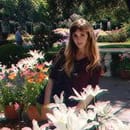Growing up with a father who had gone to art school and did everything from painting to creating cover art for Polish punk bands of his day, and a mother who had a musical background, my creativity thrived – and it was highly encouraged. However, as I got older, the question of “what do you want to be when you grow up?” loomed more and more ominously as the years went by. Personal turmoil at home had left me lost for a bit in my high school years in particular, so by that point I was done with academia and wanted to let my creativity flow. I dreaded the idea of taking one more math or chemistry class, as for those subjects in particular, my brain is wired in a way where I have very specific ways that I learn and retain information. Humanities and liberal arts were subjects I understood and grasped in a breeze.
After much soul searching, I was left with a vision of me finally leaving suburbia and settling down in a bigger city, in an artist studio that resembled a bit of a warehouse, where I could paint, develop photographs, write on my typewriter, and let everything flow. The natural course of action seemed to be art school, so I put together a portfolio of my work and applied – and got in. From my top two choices, I had accepted my offer to Academy of Art University, right in the heart of downtown (be in a bigger city – check). After a glorious summer spent showing my best friend my homeland and then having a wild two weeks in Ibiza, my college life had officially begun. I had started off studying multimedia and web design, however I very quickly felt out of place and like I was not actually happy pursuing this as a major. One day, sitting across the street from MOMA in Yerba Buena Gardens, I saw a group of AAU photography students walking around taking photos for an assignment – and suddenly, everything clicked. I remembered how much I loved developing my own film in seventh grade, how I had learned to have a camera glued to my hands since age five. I could see the sparks in these student’s eyes as they observed and rushed from one plant to a bench to a tree, almost as if they couldn’t get enough shots. It looked fun, and I wanted in. That very day, I inquired about changing my major, and ended up officially declaring photography as my major. It wasn’t all fun and games, however. The classes were difficult, and intimidating (who knew that photography involved so much math??) – both the technical classes that dealt with teaching photoshop or how to set up all and any kinds of lighting for studio shoots, to the more conceptual courses which taught me how to think outside of the box, pushed me in the best ways imaginable. I had to each week, be open and vulnerable, show what I had worked on, and had a group of 20-some peers and a professional in the field to openly critique my work right in front of me. Sometimes the feedback was positive, other weeks I had missed the mark – but to this day, I am eternally grateful for all of the memories, the people I met there, and the lessons I learned. I recall having private tutoring from one of my frequent professors, and he had asked me what I intended to do with my photography degree once I graduated – I had by that point, strongly zoned in on documentary and street photography, so I told him I envisioned being a photo-journalist of sorts. He scoffed and told me, “Everyone wants to work for National Geographic. Don’t get your hopes up.”
That got me thinking that he in a way, had a valid point – how would I distinguish myself in an increasingly competitive and expensive field? I thought long and hard about how I could make myself stand out a bit, and since I had wanted to do documentary/photojournalism, I immediately recalled growing up and spending my afternoons at my mom’s work at Stanford, where i was allowed to use a typewriter to type out my poetry and short stories. I started off focusing more on studying journalism, however I quickly realized that I didn’t want to be limited to the sort of writing that I do, and so I went into English a bit more broadly. Reading and writing was something that had always come naturally to me and I loved doing it, so my next step was to get credentials in English literature and creative writing in order to be able to get work that way. To save money, I studied English at community college (highly recommend!) as well as back in Europe where a college education is much more affordable, if not free, depending on where you go and if you have citizenship.
Most people will tell you that there is no use for an English or Liberal Arts degree, as you end up not getting anything back for the money you spent on your education. There is also the misconception that the only work for English majors is teaching, which especially depending on what level you are looking to teach, can be quite a lengthy process. However, that notion is simply not true, as there is a wide range of work for writers – anywhere from copywriting, to publications, to journalism, to marketing and so on. The possibilities truly are limitless, and after all, tech and sciences are great fields, but the world needs creatives, as well. Without art and music and literature, the world would be very boring, indeed.


